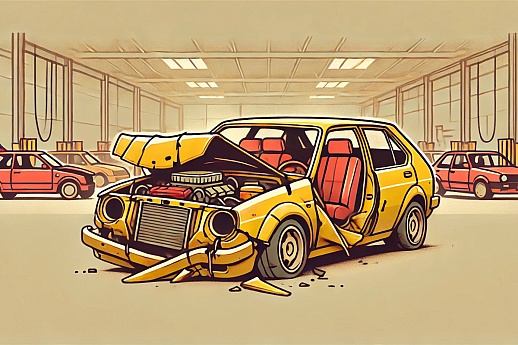What Is the Difference Between Diesel and Gasoline?
You’ve probably heard that diesel is great for heavy-duty vehicles, but is it right for your car? Or maybe you’re wondering why gasoline engines are more common.
In this blog, we’ll break down everything there is to know about the difference between diesel and gas, helping you understand which one suits your driving needs and lifestyle best.
How to Tell the Difference Between Gas and Diesel
The easiest way to tell the difference between diesel and gas is by how they are made and used. Gasoline is commonly used in most regular cars and small vehicles. It evaporates more quickly and ignites at lower temperatures.
Diesel is used in larger vehicles like trucks and buses that require more power.
You can also tell the difference by looking at the fuel pump. Diesel nozzles are usually larger to prevent drivers from accidentally filling their smaller cars with diesel. Pumps are also clearly marked to avoid confusion.
Diesel Engine vs. Gas Engine: Key Differences
Let’s take a closer look at the key difference between diesel and gas engines to understand their unique advantages.
Fuel Efficiency and Power: Does Diesel Last Longer than Gas?
Diesel lasts longer than gas because it contains more energy per gallon compared to gasoline. This means that diesel vehicles can travel longer distances on the same amount of fuel. That’s why it is used in vehicles that go on long trips or heavy-duty use, like buses and trucks.
Not only that, diesel engines generate more torque, which gives them more pulling power. This is why they are commonly used for towing or carrying heavy loads. Because of that, diesel engines also tend to have a longer lifespan.
Performance: Why Is Diesel Better Than Gas?
Because diesel engines produce more torque, they can do a great job in tasks that require strength. This can be for towing heavy loads and even driving in challenging conditions like a steep incline or rough, uneven terrain.
Diesel engines also use compression ignition to ignite the fuel. This system burns fuel more efficiently and delivers steady, strong power at lower speeds. That’s why it makes them perfect for trucks and large vehicles that need more power than speed.
On the other hand, gasoline engines offer quicker acceleration, which makes them better for everyday city driving or those who prefer a faster, lighter vehicle.
Cost and Maintenance
Another significant aspect of the difference between diesel and gas is their cost and maintenance. Diesel vehicles often cost more than gas-powered ones because they are built stronger, more durable, and can handle more miles. Depending on the model and brand, diesel cars can be $1,000 to $3,000 more expensive than gasoline.
Maintenance for diesel engines is sometimes less frequent compared to gas engines. But when repairs are needed, they can be more expensive. For example, a routine oil change for a diesel engine can cost around $50 to $70, compared to $20 to $40 for a gasoline engine. Also, diesel engines generally hold more oil than gasoline engines. Major repairs, like replacing diesel injectors, can run upwards of $1,500 to $2,500. The same repairs for gasoline engines cost around $200 to $1,000 for a full set.
Diesel fuel prices also tend to be higher than gasoline. As of October 2024, the national average for diesel is about $3.63 per gallon, while gasoline’s average is $3.17. Despite these higher costs, diesel engines can offer long-term savings if you need a vehicle for heavy use. If you mostly need to drive in the city and make short trips, gasoline vehicles are more affordable to buy, maintain, and fuel.
Environmental Impact
Diesel engines have been heavily criticized for emitting higher levels of nitrogen oxides (NOx) and particulate matter. These contribute to air pollution and can worsen respiratory health, more particularly in urban areas with heavy traffic.
However, modern diesel engines are cleaner than older models. They are manufactured with advanced emission controls, like selective catalytic reduction (SCR) and diesel particulate filters (DPF), which reduce harmful emissions.
Both gasoline and diesel engines put carbon dioxide into the atmosphere. However, diesel engines typically release less carbon dioxide per mile due to better fuel efficiency.
If you want to reduce your carbon footprint even more, you may want to check out hybrid vs. electric car options.
Availability and Accessibility
In urban and suburban areas, almost every gas station offers gasoline. They even offer multiple options, including regular, mid-grade, and premium. This makes gasoline much more accessible than diesel and a more convenient option for everyday drivers who don’t want to worry about finding a station that sells the right fuel.
Diesel is also widely available. It may be more common in rural areas or along major highways, where commercial trucks and heavy-duty vehicles frequent. However, it shouldn’t be hard to find in most areas.
Cold Weather Performance: Does Diesel or Gas Perform Better in Cold Conditions?
Gasoline is more volatile and ignites more easily in cold temperatures. As a result, gasoline engines tend to perform better in cold weather. They also warm up faster, helping both the engine and cabin reach the required temperature sooner.
That said, diesel fuel can thicken at very low temperatures. This makes it harder for the engine to start and run smoothly. To overcome this, diesel engines may require extra equipment like block heaters or additives to keep the fuel from thickening.
Driving Experience: How Diesel and Gas Affect the Feel of Driving
Diesel engines are built for torque and provide strong pulling power at lower speeds. This makes diesel-powered vehicles feel more robust when accelerating from a stop or climbing hills. This is why they are preferred for towing or hauling heavy loads. Diesel engines also rev lower and may feel slower or less responsive for quick bursts of speed.
Gasoline engines, in contrast, are designed for higher revs and faster acceleration. This gives gasoline-powered cars a lighter, more responsive feel, especially at higher speeds.
Additionally, diesel engines tend to be noisier than gasoline engines. They may also vibrate more, which can affect cabin comfort. Gasoline engines provide a more comfortable ride as they are quieter and smoother.
The Difference Between Diesel and Gas: FAQ
Let’s address some of the most frequently asked questions about the difference between diesel and gas.
Are Diesel Cars Better?
Diesel cars aren’t necessarily better, but it depends on how you use your vehicle. If you often tow heavy loads or drive long distances, a diesel car could be a better choice because of its power and fuel efficiency.
However, if you mostly drive around the city or take shorter trips, a gasoline car could be more comfortable since it’s usually quieter and smoother.
Is Unleaded Gas Diesel?
No, unleaded gas and diesel are two completely different types of fuel. Unleaded gas is made for gasoline engines because it is lighter and ignites easily. On the other hand, diesel fuel is heavier and needs high pressure to ignite. It is used in diesel engines.
Does Diesel Burn Slower Than Gas?
Diesel engines are more fuel-efficient than gasoline engines due to higher compression rates and thermodynamic efficiency. However, this fuel efficiency is not due to diesel burning slower than gasoline.
Is Diesel Heavier Than Gas?
Yes, diesel is heavier and denser than gasoline. While diesel is denser than gasoline, the increased efficiency of diesel engines is primarily due to engine design and combustion processes, not the fuel's density.
Which Is Worse, a Little Gas in a Diesel Motor or a Little Diesel in a Gas Motor?
Both are bad, but putting gas in a diesel engine is worse. Gasoline doesn’t ignite the same way diesel does, and it can cause serious damage to parts like the fuel pump and injectors that rely on diesel lubrication.
Putting diesel in a gas engine is also harmful but is less severe than gas in a diesel engine. It typically results in misfires or clogs in the fuel system.
Speaking of putting the right items in your car, that goes for more than just the gas tank. Ensure you have all the essential items to keep in your car, like a spare tire, emergency kit, and jumper cables in case of breakdowns.
What Does Diesel Look Like?
Diesel fuel has a clear to light amber color. It can sometimes appear slightly green or blue if additives are used. It’s thicker and more oily than gasoline. It also has a strong odor that doesn’t evaporate quickly.
Is Diesel More Efficient Than Gas?
Yes, diesel fuel contains more energy per gallon than gasoline, which means vehicles with diesel engines can travel further on less fuel. Switching to diesel can be a great way to improve fuel economy and reduce fuel consumption, but there are other ways to save gas while driving.
Diesel vs. Gas - Which Is Right for You?
When deciding between diesel and gasoline, it all depends on how you use your vehicle, your budget, and whether you prioritize long-term savings or lower costs now.
Diesel may be right for you if you often drive long distances, tow heavy loads, or want better fuel efficiency over time. Diesel engines are also more durable but cost more upfront. Repairs can also be pricier compared to gasoline vehicles.
On the other hand, if you drive shorter distances and prefer a car with faster acceleration and lower initial costs, a gasoline vehicle may be a better fit. They are also cheaper to buy and maintain in the short run.
Whichever option you choose, make sure you drive safely and maintain a good record to save on car insurance.



